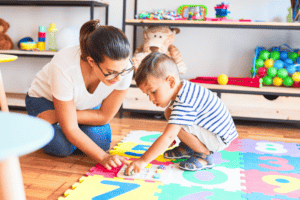(Listen to this content instead on our podcast)
Justine’s son Henri was just over 2 when she first thought he may have a developmental delay. He only said a few words, and had trouble picking up small toys with his fingers. He often seemed frustrated and had frequent meltdowns. Justine was concerned because he didn’t seem to do the same things as the other kids in his day care. She asked his pediatrician about this, and they did a developmental screening, which showed that Henri was not hitting some of the milestones for his age. Justine wanted to get help for him and worried how these challenges would affect his learning when it was time to start school. Where could she start?
This is a common story! About 1 in 5 children have some kind of disability or developmental delay, and there are systems to help, from birth through age 21.
What are Early Childhood Special Needs Services?
A federal law called the Individuals with Disabilities Education Act (IDEA) requires all states to provide special needs services for children with qualifying disabilities.
The law drives these two programs:
-
Early Intervention (or EarlySteps) provides services for kids from 0-3 and their families. (IDEA, Part C)
-
Special Education provides services to kids from age 3-21 (IDEA, Part B)
Justine took the first step of talking to her son’s doctor. Her next step was to connect with EarlySteps (Early Intervention). They did an evaluation to see what areas Henri is behind on. He qualified because he has delays in 2 areas: speech and fine motor skills.
It’s important to catch any delays as early as possible. Children’s brains develop tremendously in their first 3 years. If they can get services like speech therapy or occupational therapy early on, they have a better chance to fully develop their skills and abilities.
Justine was relieved that Henri’s skills improved when he started getting speech therapy and occupational therapy (OT). But she knew that EarlySteps would end when he turned 3. At that point the school system would be in charge of providing his disability services if he still qualified.
Speech and OT are just 2 of many services a child can get to support their learning and development. There are other kinds of therapies to support things like social emotional development, sensory processing or behavior challenges. A child may also get specialized instruction when learning skills like reading or math.
Transitioning into School-Based Services
At age 3, IDEA Part B services kick in: Special Education from the school system. Even though a child may not be in school until age 5, they can get services now to support disabilities that will affect their education. They will have to get a new evaluation to make sure they qualify. The criteria are not exactly the same as for Early Intervention, and the delay or disability has to affect their ability to learn and function in school. For example, Henri’s trouble using his fingers will make it hard for him to hold a pencil even though he doesn’t need that skill yet.
When Henri was 21/2, Justine worked with her EarlySteps coordinator to prepare for the transition to school-based services (special ed). The coordinator contacted the Child Find department in her school district, and sent them Henri’s records. They planned a transition meeting with the EarlySteps team and the school district. Then Henri had a special ed evaluation to see if he qualified.
If your child is in Early Intervention, the Family Service Coordinator (FSC) will contact the school system and help with the process. But if you are not in Early Intervention, you should call the Child Find or Special Ed department yourself. It’s important to make this connection early so the services can start right away when your child turns 3. Search your school district’s website for “Child Find”, “Child Search” or “Special Education”.
Writing the Individualized Education Program (IEP) and Starting the Special Needs Services
Henri qualified! The next step was to have a meeting with the school system to develop an Individualized Education Program (IEP) for him. As a single mom, Justine wanted someone with her at the meeting for moral support. She brought a close friend, who knows Henri well, to help her understand and remember what was said at the meeting, and to help her speak up if needed.
The IEP (Individualized Education Program) is a legal document that describes a child’s goals and the services that the school will provide. It must be written with input from the parents. If you are not happy with the goals or the level of services written into the IEP, you can advocate for more. The parents are always an important part of the IEP team!
When Henri turned 3, his IEP was in place and he started getting speech therapy and OT (Occupational Therapy) 3 times a week. He got a spot in a Head Start preschool and sees his therapists at school during the week. Justine talks to the teacher and therapists regularly and uses their strategies at home as much as possible. Henri’s skills are improving and he seems happier and more engaged. Justine is so glad that she helped him get the support as early as she did!
If your child is in preschool, they can get the services there. If not, you may take them into a local school or community center for each session. Either way, make sure to keep in touch with the therapists and keep track of your child’s progress. If they are not making progress towards their goals, you may need to call another meeting with the IEP team and make changes if needed. You have a right to do this anytime you have a concern
This process can be hard, but if you know your rights, understand the help your child can get, and advocate for their needs, your child can have the support they need to start school successfully.




